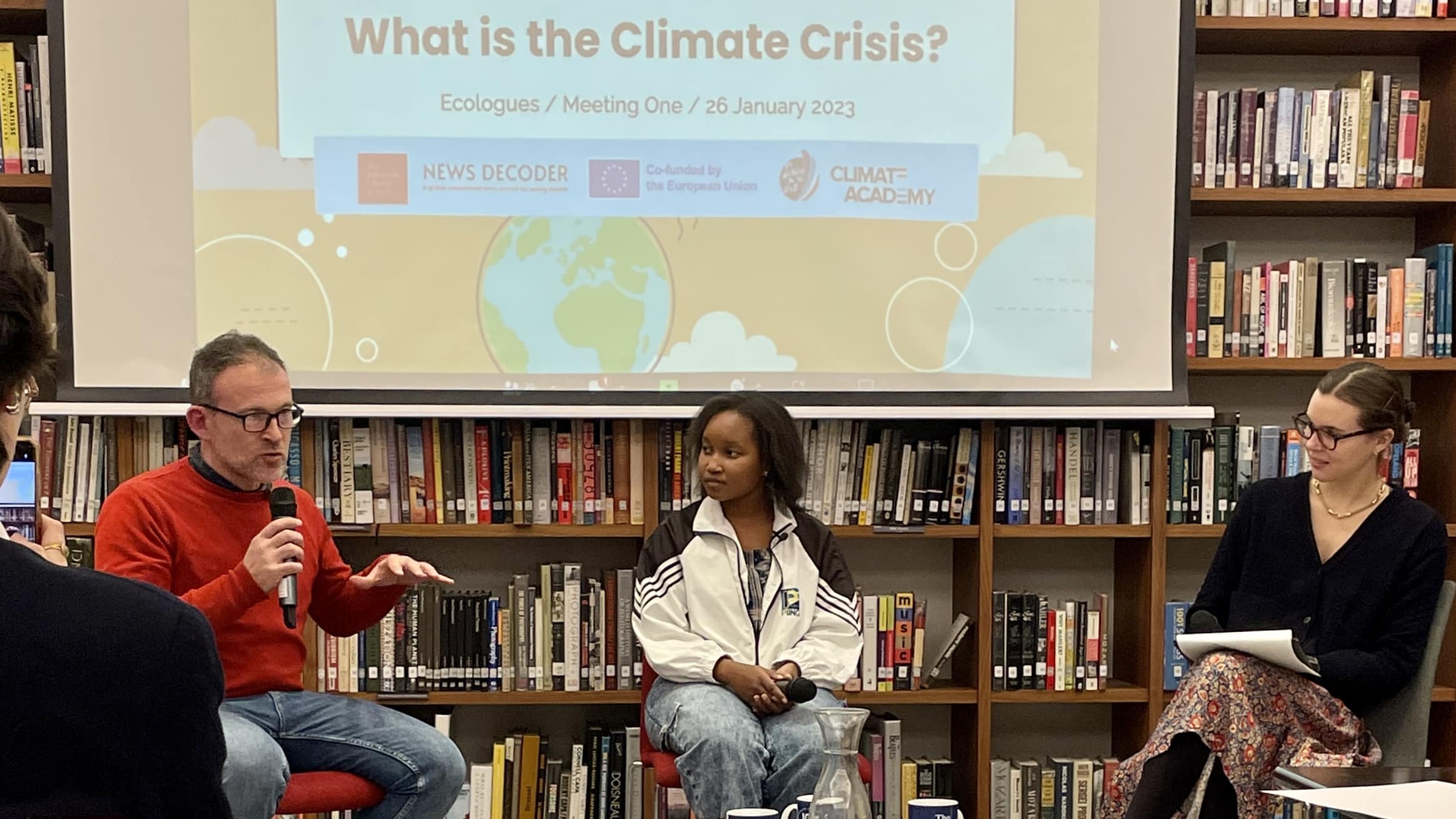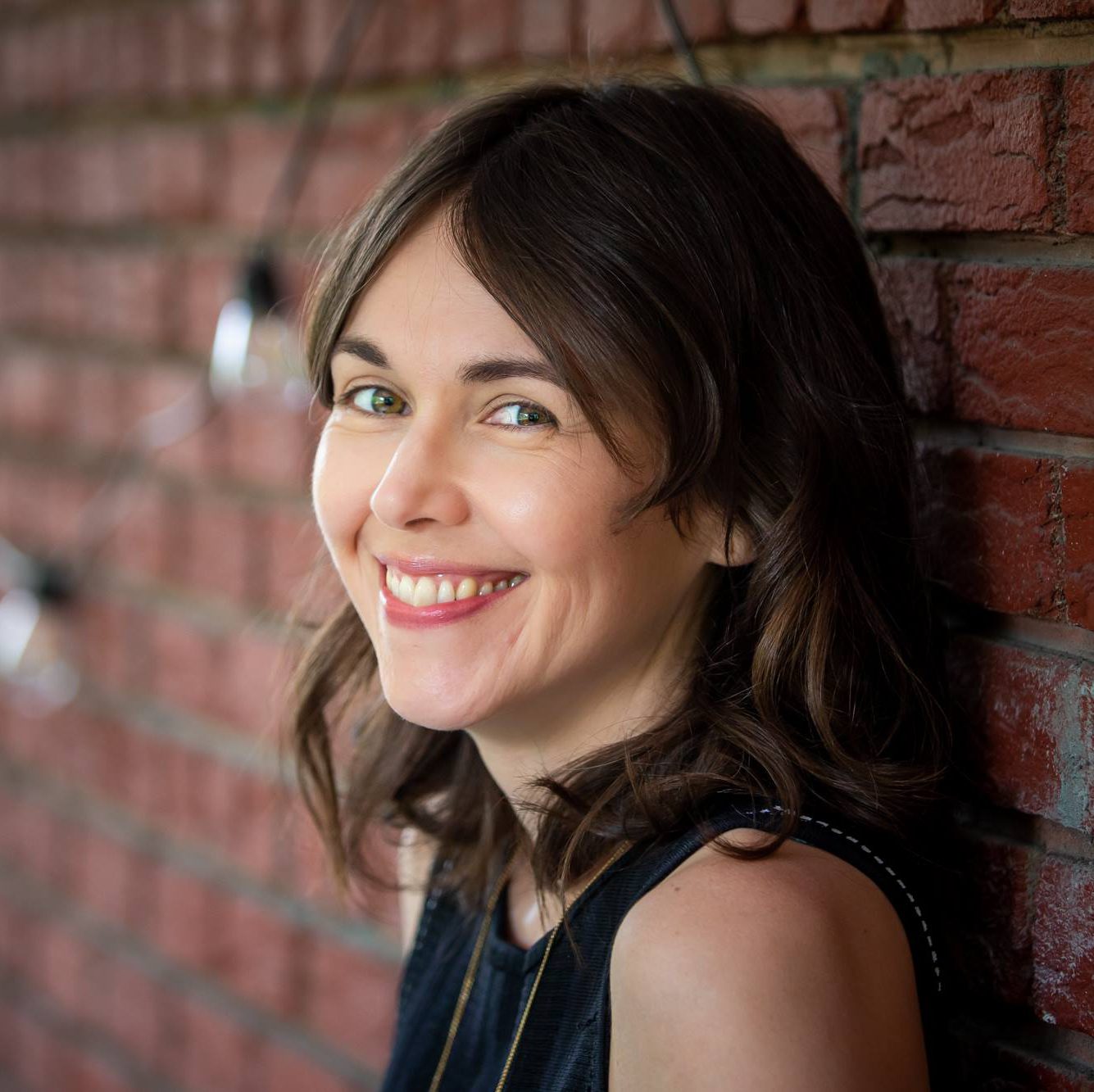Three experts discuss solutions to climate issues from the perspective of education, activism and journalism.

Ecologues with Matthew Pye, Rahmina Paullete and Alice McCrum at the American Library in Paris in Paris, France, 26 January 2023.
What are schools missing in climate change education? What inspires young people to become climate activists? How can the media tell these stories?
These questions emerged from “What Is the Climate Crisis?,” the first Ecologues meeting held on Thursday, 26 January, presented by News Decoder, the Climate Academy and the American Library in Paris.
“While it is true that ‘what is the climate crisis?’ is very overwhelming and kind of enormous and unanswerable, it’s also true that there are responses,” said Alice McCrum, head of adult cultural programming at the Library and moderator of the session.
The talk — the first of a six-part monthly series held in-person at the Library and online — brought together three voices to discuss solutions to climate issues from the perspective of education, activism and journalism.
A systems-level view of the climate crisis
Matthew Pye, philosophy teacher, author and founder of the Climate Academy at the European School Brussels II — a News Decoder partner school — presented his approach to rethinking how schools teach climate change.
“Schools tend to do climate and environmental things on an individual basis,” Pye said. “So, individual problems, individual actions. What’s really missing in educational things about the crisis is a systems-level view.”
Outlining the causes of climate change with a series of data-driven infographics, Pye focused on greenhouse gas levels in the atmosphere, which continue to rise.
“No matter how many solar panels you see when you drive on holiday, how many debates we have, we are still increasing and accelerating CO2 levels,” Pye said. “There is a systemic problem, and that’s not often visible in the media.”
Personal experience propels activism
Rahmina Paullete is the founder of Kisumu Environmental Champs in Kenya, an NGO focused on environmental conservation, advocacy and awareness to restore the ecosystem of Lake Victoria. Paullete, 17, became a climate activist in 2020 after witnessing catastrophic changes and displacement in her community due to climate change.
“All this oppression that was bigger than the solution drove me into becoming a climate activist,” she said. “Seeing all of these changes and being one of the people who was a victim of the floods that happened. When I was five years old we had to leave the island and most of the people that I knew died. Some of my family members died.”
Her climate activism sprang from the emotional trauma that she and her community experienced.
“If you look back at what happened, we’re thinking our future lies upon our voices, and if we do not speak about it, if we do not speak about the truth, then it is like we are lying to ourselves.”
“Knowledge about climate change has spread a lot.”
For Alister Doyle, former environmental reporter for Reuters and a News Decoder correspondent, personal stories like Paullete’s are the best way to express the magnitude of the climate crisis, and make statistics like the ones Pye referenced more relatable.
“It’s just a way of making it more accessible for people to understand some of this data,” Doyle said. “There is not enough focus on data.”
Doyle, who has reported on climate for more than 20 years, has seen a shift in climate coverage.
“Since that time in 2005 when the U.S. wasn’t even willing to talk about the long-term problem of climate change, it has become everything,” Doyle said. “Every story you write as a journalist, if you can write a story about the economy or health, there is always a climate angle to it.”
“The knowledge about climate change has spread a lot,” Doyle said.
A forum for interdisciplinary debate
Ecologues is the next phase of The Writing’s on the Wall climate education project, which helps young people combat the climate crisis through journalism, activism and art with funding from Erasmus+.
For one guest, attending Ecologues was a way to go beyond the alarming climate education she learned in school.
“I really wanted to be in an academic setting discussing these important issues and how professionals that have studied their entire lives view it and what they think the solutions are,” she said. “That way it doesn’t seem like the world will end in my lifetime.”
The full webinar recording is available here. The next Ecologues meeting on the theme of Environmental Justice will take place on Thursday 23 February 2023 at the American Library in Paris and online. Learn more and RSVP at the American Library website.
Questions to consider:
- Why is systems-level change important in fighting the climate crisis?
- What are the biggest environmental concerns in your community? How is the community finding solutions?
- Do you think it’s important to tell personal stories?

Maria Krasinski is News Decoder’s Managing Director. Previously she worked in public diplomacy and youth media in Chicago before serving in the Peace Corps in Tbilisi, Georgia. She is a published illustrator of two art history books with a third in production.
